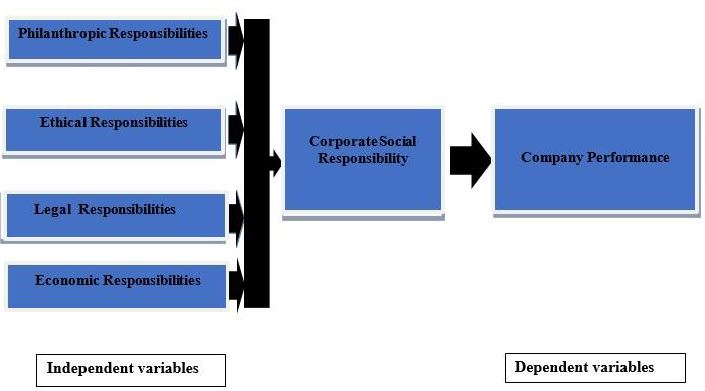The Effect of Corporate Social Responsibility in the Telecommunication Sector: A Case of Zamtel Ltd.
DOI:
https://doi.org/10.5281/zenodo.11063714Keywords:
corporate social responsibility (csr), community, financial performance, responsibility and stakeholders, zambia information and communication technology authority, zamtel limited and world business council for sustainable developmentAbstract
Corporate Social Responsibility can be defined as a concept whereby businesses willingly integrate social, environmental and ethical standards into their operations in order to improve the organisation’s performance, lives of employees, local communities and the society as a whole. The study focused on determining the effect of Corporate Social Responsibility in the telecommunication sector: a case of Zamtel Limited. Previous studies have mainly focused on investigating the relationship between Corporate Social Responsibility and the company’s financial performance. Very little information is available on the concept with regard to the reasons why companies in the mobile telecommunication industry are engaging in Corporate Social Responsibility programmes. The researcher used a descriptive research design. Simple random sampling and purposive sampling methods were used to select a sample which comprised managers, unionised employees and customers of Zamtel limited. Out of a sample of 145 participants, only 120 questionnaires were answered and returned. This represented an 85 % response rate which was very satisfactory. Primary data was collected through a questionnaire which had both quantitative and some qualitative questions. The data was analysed using descriptive statistics and multiple regression analysis. The results of the study showed that the independent variables being; the economical, ethical, legal and philanthropic responsibilities had a relationship with the dependent variable which is the company performance. The conclusion of this study was based on the multiple linear regressions, which examined the cumulative effect of the independent variables on the dependent variable. The multiple linear regressions gave a multiple correlation coefficient of 0.979, which showed that the relationship between the four independent variables cumulatively on the dependent variable was very strong and positively correlated. This implied that by investing in Corporate Social Responsibilities, companies in the telecommunication sector will have improved performance owing to customer and employee loyalty among other reasons. The study recommends that Zamtel Ltd invests in its employees and increases the support to social causes.
Downloads
References
Adeoye, A. O., & Alaka, N. S. (2017). Effects of corporate social responsibility on banks financial perfomance in Nigeria: A study of United Bank of Africa. International Journal of Business, Economics and Management, 136-147.
Ahmed, S. U., Islam, M. Z., & Hasan, I. (2012). Corporate social responsibility and financial performance linkage- Evidence from. Journal of Organisational Management, 1(1), 14-21.
Asamoah, G. (2021). Impact of corporate social responsibility on firm financial performance in Ghana. ResearchGate, pp. 1-156.
Bazzano, L. A., Durant, J., & Brantley, P. R. (2021). A modern history of informed consent and the role of key information. The Ochsner Journal, 1(21), 81-85.
Caroll, A. B. (2017). A history of corporate social responsibility: Concepts and practices. The Oxford Handbook of Corporate Social Responsibility, pp. 19-46.
Carroll, A. B. (2021). Corporate social responsibility: Perspectives on CSR construct's development and future. Business & Society, 60(6), 1258-1278.
Certanec, A. (2019). The connection between corporate social responsibility and corporate respect for human rights. Danube: Law, Economics and Social Issues, 10(2), 103-127.
Cho, S. J., Chung, C. Y., & Young, J. (2019). Study on the relationship between CSR and financial performance. Sustainability MDPI, 11(343), 1-26.
Chung, Y., & Yoon, B. (2018). The effects of corporate social responsibility on firm performance: A stakeholder approach. Journal of Hospitality and Tourism, 37, 89-96.
Eastman, J. K., Smalley, K. B., & Warren, J. C. (2019). Management the impoact of cause- Related marketing on millenials' product attitudes and purchase intentions the impact of cause-related marketing on millenials' product attitudes and purchase intentions. Journal of Promotion Management, 25.
Giannarakis, G., Konteos, G., Zafeiriou, E., & Partalidou, X. (2016). The impact of corporate social Responsibility on financial Performance. Invetsment Management and Financial Innovations, 13(3), 1-13.
Hudson, B., Hunter, D., & Peckham, S. (2018). Policy failure and Policy-Implementation gap: Can Policy Support Programs help?. Policy Design and Practice, 2(1), 1-14.
Kabeyi, M. J. B. (2019). Organizational strategic planning implementation and evaluation with analysis of challenges and benefits for profit and nonprofit organizations. Internal Journal of applied Research Studies, 27-32.
Yagba, H., Ayangeadoo, A., Enngo, & Philip, T. (2021). Corporate social responsibility of mobile telecommunications network (MTN) in federal capital territory (FCT) Abuja, Nigeria. Journal of Business and Management, 23(4), 59-70.

Downloads
Published
How to Cite
Issue
Section
License
Copyright (c) 2024 Sylvester Inambao Masiye, Fatima Mandhu

This work is licensed under a Creative Commons Attribution 4.0 International License.
Research Articles in 'Management Journal for Advanced Research' are Open Access articles published under the Creative Commons CC BY License Creative Commons Attribution 4.0 International License http://creativecommons.org/licenses/by/4.0/. This license allows you to share – copy and redistribute the material in any medium or format. Adapt – remix, transform, and build upon the material for any purpose, even commercially.









